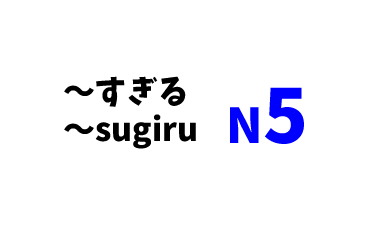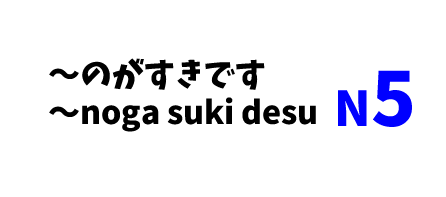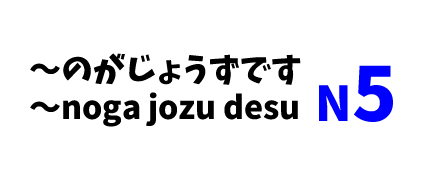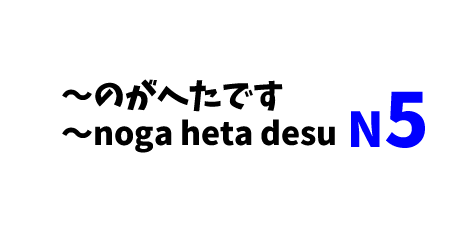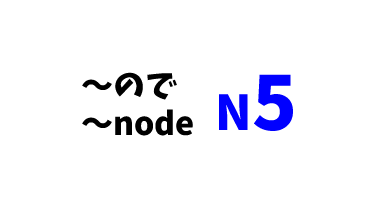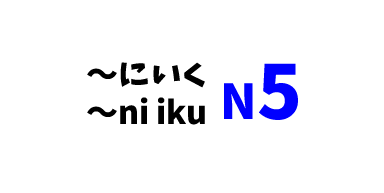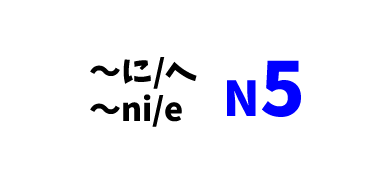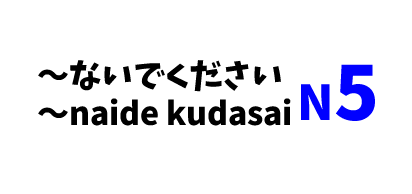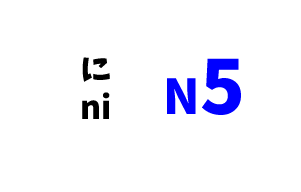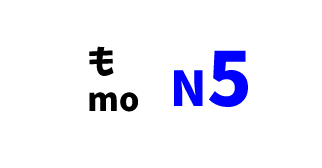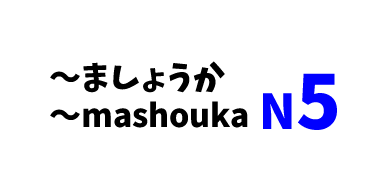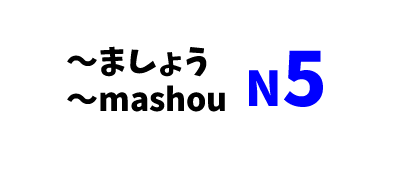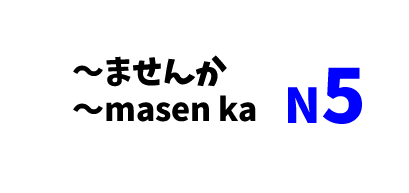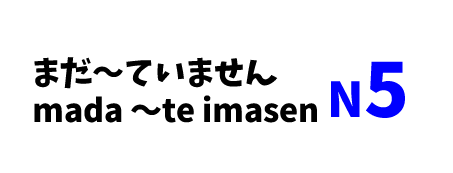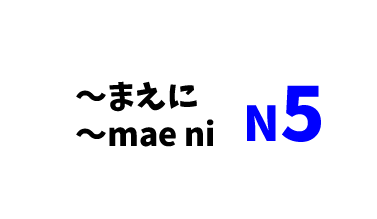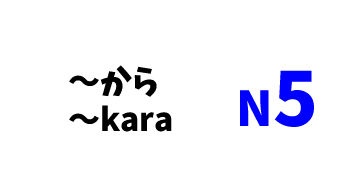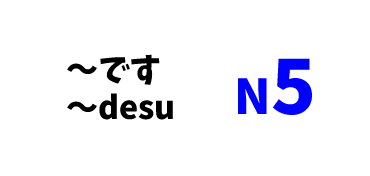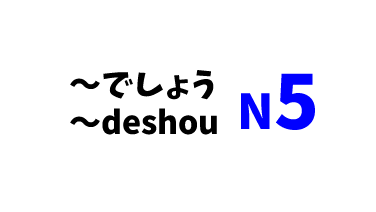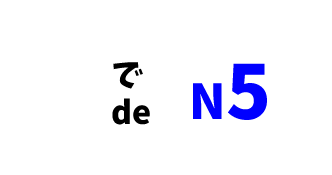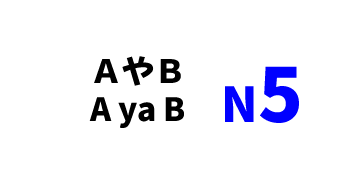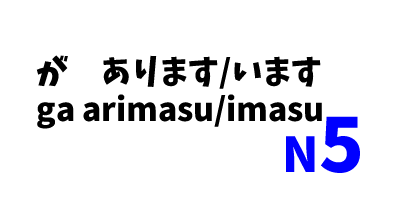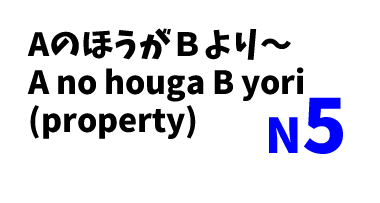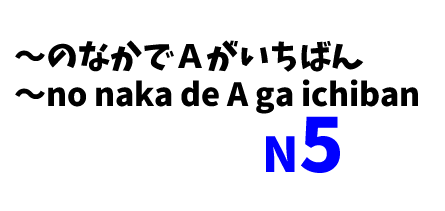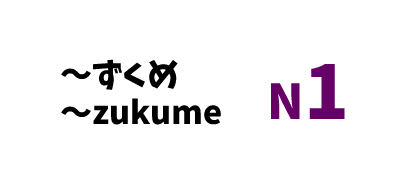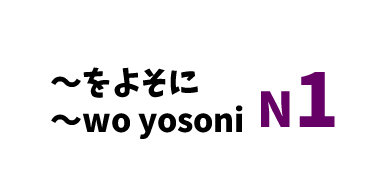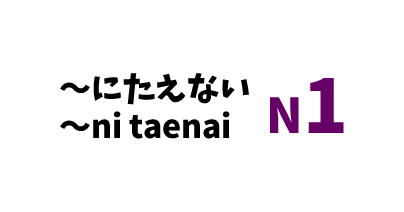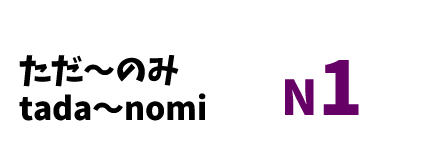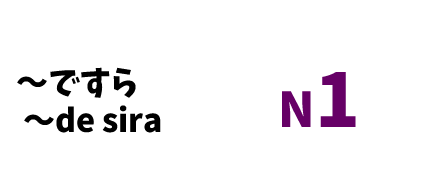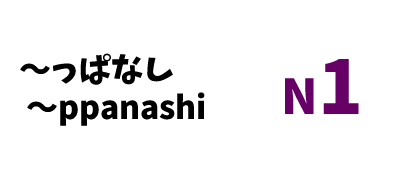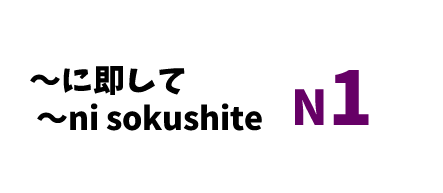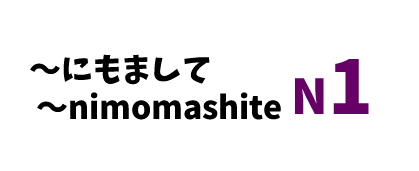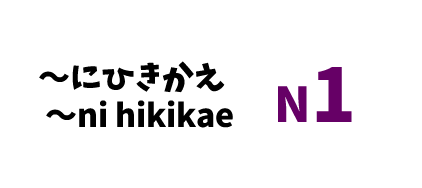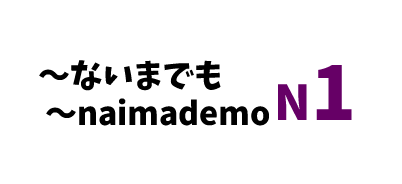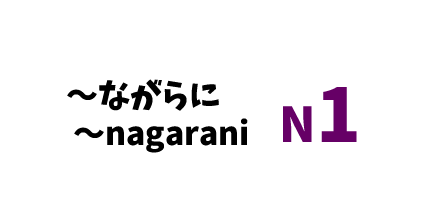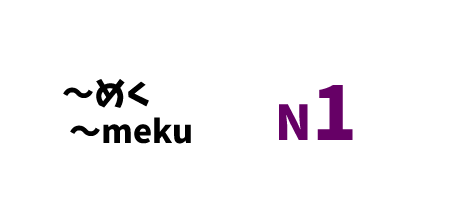~すぎる ~sugiru How to make”~すぎる..” in Japanese. ・ Meaning:doing too much ・ JLPT Level: N5 日本語能力試験N5級レベル ・ … 【N5】~すぎる/~sugiruRead more
STUDY JLPT
STUDY JLPT
【N5】~のがすきです/~noga suki desu
~のがすきです ~noga suki desu How to make”~のがすきです..” in Japanese. ・ Meaning: to like (to verb.) ・ … 【N5】~のがすきです/~noga suki desuRead more
【N5】~のがじょうずです/~noga jozu desu
~のがじょうずです ~noga jozu desu How to make”~のがじょうずです..” in Japanese. ・ Meaning:be good at (dictionary form) ・ … 【N5】~のがじょうずです/~noga jozu desuRead more
【N5】~のがへたです/~noga heta desu
~のがへたです ~noga heta desu How to make”~のがへたです..” in Japanese. ・ Meaning:be poor at (dictionary form) ・ … 【N5】~のがへたです/~noga heta desuRead more
【N5】~ので/~node
~ので ~node How to make”~ので..” in Japanese. ・ Meaning:because ・ JLPT Level: N5 日本語能力試験N5級レベル ・ Category: … 【N5】~ので/~nodeRead more
【N5】~にいく/~ni iku
~にいく ~ni iku How to make”~にいく..” in Japanese. ・ Meaning: go to ( verb) ・ JLPT … 【N5】~にいく/~ni ikuRead more
【N5】~に/へ ~ni/e
~に/へ ~ni/e How to make”~に/へ..” in Japanese. ・ Meaning: goal of movement, to (place, etc) ・ … 【N5】~に/へ ~ni/eRead more
【N5】~ないでください/~naide kudasai
~ないでください ~naide kudasai How to make”~ないでください..” in Japanese. ・ Meaning: to request that someone refrain from … 【N5】~ないでください/~naide kudasaiRead more
【N5】に /ni
に ni How to make”に..” in Japanese. ・ Meaning: time reference, at on in (time) … 【N5】に /niRead more
【N5】も/ mo
も mo How to make”も..” in Japanese. ・ Meaning: too, also as well ・ JLPT … 【N5】も/ moRead more
【N5】~ましょうか / ~mashouka
~ましょうか ~mashouka How to make”~ましょうか..” in Japanese. ・ Meaning: Shall I/ We do something..,suggestions. ・ … 【N5】~ましょうか / ~mashoukaRead more
【N5】~ましょう/ ~mashou
~ましょう ~mashou How to make”~ましょう..” in Japanese. ・ Meaning: Let’s do something. ・ JLPT Level: … 【N5】~ましょう/ ~mashouRead more
【N5】~ませんか /~masen ka
~ませんか ~masen ka How to make”~ませんか..” in Japanese. ・ Meaning: Won’t you – , How … 【N5】~ませんか /~masen kaRead more
【N5】まだ~ていません/ mada ~te imasen
まだ~ていません mada ~te imasen How to make”まだ~ていません..” in Japanese. ・ Meaning: have not….yet ・ JLPT … 【N5】まだ~ていません/ mada ~te imasenRead more
【N5】~まえに/~mae ni
~まえに ~mae ni How to make”~まえに..” in Japanese. ・ Meaning: before doing ・ JLPT Level: … 【N5】~まえに/~mae niRead more
【N5】~から /~kara
~から ~kara How to make”~から..” in Japanese. ・ Meaning: because~ ・ JLPT Level: N5 日本語能力試験N5級レベル … 【N5】~から /~karaRead more
【N5】~です/ ~desu
~です ~desu How to make”~です..” in Japanese. ・ Meaning: is, are,am (to be) ・ JLPT … 【N5】~です/ ~desuRead more
【N5】~でしょう/ ~deshou
~でしょう ~deshou How to make”~でしょう..” in Japanese. ・ Meaning: making a guess or prediction. ・ … 【N5】~でしょう/ ~deshouRead more
【N5】で/ de
で de How to make”で..” in Japanese. ・ Meaning: 助詞 (動作の起こる場所、動作や作用の行われる時や場所/動作の手段など) at, in, on (place) <indicate … 【N5】で/ deRead more
【N5】AやB /A ya B
AやB A ya B How to make”AやB..” in Japanese. ・ Meaning: 並立を表す。 “Ya” suggest that … 【N5】AやB /A ya BRead more
【N5】があります/います ga arimasu/imasu
が あります/います ga arimasu/imasu How to make”が あります/います..” in Japanese. ・ Meaning: 存在 There is/are (thing) – … 【N5】があります/います ga arimasu/imasuRead more
【N5】AのほうがBより~/A no houga B yori (property)
AのほうがBより~A no houga B yori (property) How to make”AのほうがBより~..” in Japanese. ・ Meaning: 比較 A … 【N5】AのほうがBより~/A no houga B yori (property)Read more
【N5】~のなかでAがいちばん~/ (Class of items)no naka de A ga ichiban (property)
~のなかでAがいちばん~ (Class of items)no naka de A ga ichiban (property) How to make”~のなかでAがいちばん~..” in Japanese. … 【N5】~のなかでAがいちばん~/ (Class of items)no naka de A ga ichiban (property)Read more
【N1】~ずくめ/ ~zukume
~ずくめ ~zukume How to make”~ずくめ….” in Japanese. ・ Meaning: ~ばかり,full of / a lot of … 【N1】~ずくめ/ ~zukumeRead more
【N1】~をよそに/ ~wo yosoni
~をよそに ~wo yosoni How to make”~をよそに….” in Japanese. ・ Meaning: ~を気にしないで,Without consideration for, indifferent to … 【N1】~をよそに/ ~wo yosoniRead more
【N1】~に足(た)る /~ni taru
~に足(た)る ~ni taru How to make”~に足る….” in Japanese. ・ Meaning: ~だけの価値がある,is plenty; has value . worth … 【N1】~に足(た)る /~ni taruRead more
【N1】~にたえない(~に堪えない) /~ni taenai
~にたえない(~に堪えない) ~ni taenai How to make”~にたえない….” in Japanese. ・ Meaning: ~を我慢できない,cannot stand ・ JLPT Level: … 【N1】~にたえない(~に堪えない) /~ni taenaiRead more
【N1】ただ~のみ /tada ~ nomi
ただ~のみ tada ~ nomi How to make”ただ~のみ….” in Japanese. ・ Meaning: ~だけ、just ・ JLPT Level: … 【N1】ただ~のみ /tada ~ nomiRead more
【N1】~(で)すら /~de sura
~(で)すら ~de sura How to make”~(で)すら….” in Japanese. ・ Meaning: ~さえ,just / even if ・ … 【N1】~(で)すら /~de suraRead more
【N1】~っぱなし/~ppanashi
~っぱなし~ppanashi How to make”~っぱなし….” in Japanese. ・ Meaning: ~たまま,as it is,keep – ing ・ JLPT … 【N1】~っぱなし/~ppanashiRead more
【N1】~にそくして(~に即して)/~ni sokushite
~にそくして(~に即して)~ni sokushite How to make”~にそくして….” in Japanese. ・ Meaning: ~に従って、as、in line with ・ JLPT Level: … 【N1】~にそくして(~に即して)/~ni sokushiteRead more
【N1】~にもまして/~nimo mashite
~にもまして~nimo mashite How to make”~にもまして….” in Japanese. ・ Meaning: ~よりもっと,more than before、More than the time/period … 【N1】~にもまして/~nimo mashiteRead more
【N1】~にひきかえ/ ~ni hikikae
~にひきかえ ~ni hikikae How to make”~にひきかえ….” in Japanese. ・ Meaning: ~と比べて反対に ,compared to,In contrast to … 【N1】~にひきかえ/ ~ni hikikaeRead more
【N1】~ないまでも /~naimademo
~ないまでも ~naimademo How to make”~ないまでも….” in Japanese. ・ Meaning: ~ないにしても、.expressing the speaker’s sensation that although … 【N1】~ないまでも /~naimademoRead more
【N1】~ながらに / ~nagara ni
~ながらに ~nagara ni How to make”~ながらに….” in Japanese. ・ Meaning: ~ままで,natural, while ・ JLPT Level: … 【N1】~ながらに / ~nagara niRead more
【N1】~めく/ ~meku
~めく ~meku How to make”~めく ….” in Japanese. ・ Meaning: ~のような感じがする,like , ish ish ・ JLPT … 【N1】~めく/ ~mekuRead more
